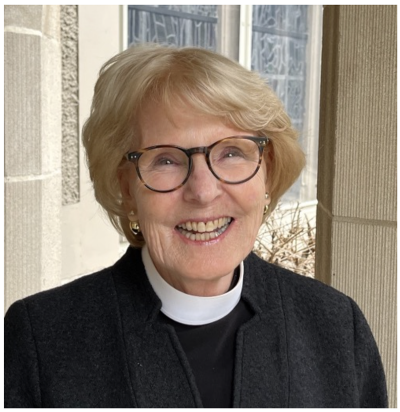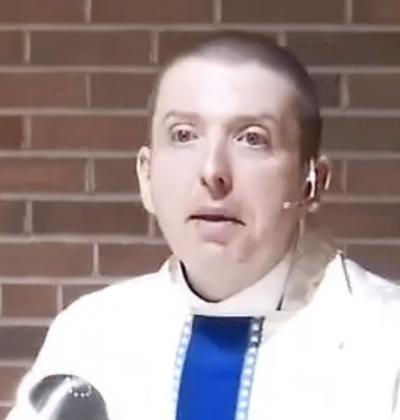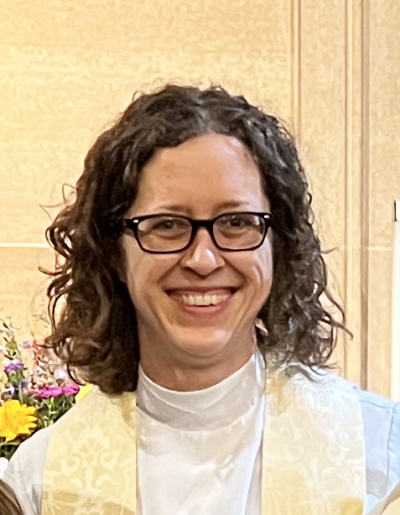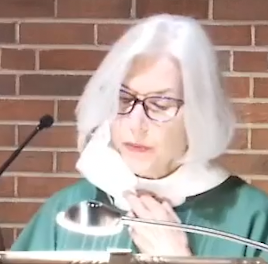All Recordings from St. Gregory's Episcopal Church
Jul 21, 2024 |
Ninth Sunday after Pentecost
| Max Smith
Ninth Sunday after Pentecost
Pastor Dan is still away at CCD, and though he’ll be back by Sunday, our deacon Max Smith will be preaching! She requested that I include in my preview the words of the beloved and well-known prayer of St. Francis of Assisi. You can listen to our quartet sing a lovely arrangement of this text here, and read the profound text below.
Lord, make me an instrument of your peace:\
where there is hatred, let me sow love;
where there is injury, pardon;
where there is doubt, faith;
where there is despair, hope;
where there is darkness, light;
where there is sadness, joy.
O divine Master, grant that I may not so much seek
to be consoled as to console,
to be understood as to understand,
to be loved as to love.
For it is in giving that we receive,
it is in pardoning that we are pardoned,
and it is in dying that we are born to eternal life.
Lord, make me an instrument of your peace:\
where there is hatred, let me sow love;
where there is injury, pardon;
where there is doubt, faith;
where there is despair, hope;
where there is darkness, light;
where there is sadness, joy.
O divine Master, grant that I may not so much seek
to be consoled as to console,
to be understood as to understand,
to be loved as to love.
For it is in giving that we receive,
it is in pardoning that we are pardoned,
and it is in dying that we are born to eternal life.
Jul 14, 2024 |
Eighth Sunday after Pentecost
| The Rev. Dr. Kyle Oliver
Eighth Sunday after Pentecost
Good Morning St Gregory’s.
It is good to be back again, all be it on an utterly, bewildering morning. I tend to think it is unwise for preachers to make big changes to sermons when news breaks on Saturday evening. Doubly so when the situation is so charged and so uncertain. I am going to hold fast to that approach except to say now that what happened yesterday to Former President Donald Trump, to the man who apparently shot him in the ear, to bystanders attending the event and to our Nation, it has all left us confused and scared and moaned. God can handle however you are feeling. I invite us all to be especially patient and gentle with each other this morning and in the days ahead.
It is good to be back again, all be it on an utterly, bewildering morning. I tend to think it is unwise for preachers to make big changes to sermons when news breaks on Saturday evening. Doubly so when the situation is so charged and so uncertain. I am going to hold fast to that approach except to say now that what happened yesterday to Former President Donald Trump, to the man who apparently shot him in the ear, to bystanders attending the event and to our Nation, it has all left us confused and scared and moaned. God can handle however you are feeling. I invite us all to be especially patient and gentle with each other this morning and in the days ahead.
Jul 07, 2024 |
Seventh Sunday after Pentecost
| Rev. Dan Puchalla
Seventh Sunday after Pentecost
Teenage Prophets
Sermon by The Rev. Dan Puchalla
Last Sunday, we read the story of Jairus and his daughter, not as a show of Jesus’ power to bring someone back from the dead, but as a story about a family who had given up on their daughter as she entered adolescence. That theme continues this Sunday, with the story of what happens when youthful Jesus comes back home. What does his rejection by his own family and neighbors reveal to us about intergenerational relationships today? How shall we think about age and who gets to speak with authority?
Sermon by The Rev. Dan Puchalla
Last Sunday, we read the story of Jairus and his daughter, not as a show of Jesus’ power to bring someone back from the dead, but as a story about a family who had given up on their daughter as she entered adolescence. That theme continues this Sunday, with the story of what happens when youthful Jesus comes back home. What does his rejection by his own family and neighbors reveal to us about intergenerational relationships today? How shall we think about age and who gets to speak with authority?
Jun 30, 2024 |
Sixth Sunday after Pentecost
| Rev. Dan Puchalla
Sixth Sunday after Pentecost
Beleaguered by Belief
I shouldn’t admit this … but I kind of detest the word “belief.” It’s a word that has come to mean too many things that I just can’t get behind. “Belief” is used as a shelter for people who want to impose their opinions on others without being subject to opposing facts and arguments. “Belief” is pitted against things like science and history. “Belief” is a way of reducing a complex religious heritage into a list of fundamental things we have to assert in order to belong to that religion. “Belief” squeezes out things like doubt and skepticism. None of these are what I mean when I say that I believe in God, in Jesus Christ, in the Holy Spirit. I wonder if you feel the same.
In this Sunday’s gospel, Jesus encounters two women whose disparate lives become mysteriously intertwined. Their belief looms large in their stories. But what this belief actually means provides an alternative to the modern ways this word is abused and used to abuse others in our time.
I shouldn’t admit this … but I kind of detest the word “belief.” It’s a word that has come to mean too many things that I just can’t get behind. “Belief” is used as a shelter for people who want to impose their opinions on others without being subject to opposing facts and arguments. “Belief” is pitted against things like science and history. “Belief” is a way of reducing a complex religious heritage into a list of fundamental things we have to assert in order to belong to that religion. “Belief” squeezes out things like doubt and skepticism. None of these are what I mean when I say that I believe in God, in Jesus Christ, in the Holy Spirit. I wonder if you feel the same.
In this Sunday’s gospel, Jesus encounters two women whose disparate lives become mysteriously intertwined. Their belief looms large in their stories. But what this belief actually means provides an alternative to the modern ways this word is abused and used to abuse others in our time.
Jun 23, 2024 |
Fifth Sunday after Pentecost
| Max Smith
Fifth Sunday after Pentecost
Storm on the Sea
Our Gospel this week: Jesus calms the sea. A story very well-known and often depicted in paintings. Rembrandt’s painting, The Storm on the Sea of Galilee is perhaps the most famous, but numerous other Masters have painted the scene as well.
For me this story has always seemed odd because four of the disciples were fishermen. They probably had grandfathers, fathers, uncles, and brothers who were fishermen too — people of the sea. They would have had a great sense of the winds and the sea and been acutely aware of the changes and dangers. How could they have been so unaware such a storm was coming?
I think the story must mean something other than the traditional ideas about terror and the power of faith to save us. What’s odd too is that the disciples awaken Jesus with outrage. Don’t you care?? We are perishing here in this boat in the storm! It doesn’t seem the right attitude to use when in need of help. They almost sound bad tempered, petulant. I would expect them to cajole, plead, implore, beg for help. Join us Sunday to consider why Mark 4:35-41 might be up to more than it seems.
Our Gospel this week: Jesus calms the sea. A story very well-known and often depicted in paintings. Rembrandt’s painting, The Storm on the Sea of Galilee is perhaps the most famous, but numerous other Masters have painted the scene as well.
For me this story has always seemed odd because four of the disciples were fishermen. They probably had grandfathers, fathers, uncles, and brothers who were fishermen too — people of the sea. They would have had a great sense of the winds and the sea and been acutely aware of the changes and dangers. How could they have been so unaware such a storm was coming?
I think the story must mean something other than the traditional ideas about terror and the power of faith to save us. What’s odd too is that the disciples awaken Jesus with outrage. Don’t you care?? We are perishing here in this boat in the storm! It doesn’t seem the right attitude to use when in need of help. They almost sound bad tempered, petulant. I would expect them to cajole, plead, implore, beg for help. Join us Sunday to consider why Mark 4:35-41 might be up to more than it seems.
Jun 16, 2024 |
Fourth Sunday after Pentecost
| Rev. Dan Puchalla
Fourth Sunday after Pentecost
This Sunday, all the readings (Ezekiel 17:22-24, Psalm 92:1-4,11-14, and Mark 4:26-34) reference trees in one way or another. I’ve often been drawn to natural imagery in the Bible, because out in the midst of God’s creation is when I feel closest to the divine. So when I first encountered the song “Jesus Christ the Apple Tree” in a college choir, the unusual image of Jesus as an apple tree struck me. I thought it was a strange comparison - and even a little silly! - at first, but when I sat with the lyrics a little longer they began to truly resonate. I was in the middle of a tumultuous faith crisis at the time, and singing the words “This fruit doth make my soul to thrive, it keeps my dying faith alive” felt like I was being thrown a spiritual lifeline.
Jun 02, 2024 |
Second Sunday after Pentecost
| Rev. Dan Puchalla
Second Sunday after Pentecost
(It’s Still) The Season to Chill
Alleluia, summer is upon us. And summer is for chilling. It’s the season of slow growth, as the living earth gently nourishes the fruits that we will harvest in the fall. It’s the season for us to soak in the abundance of life and sunshine. I believe deeply in the spiritual practice of enjoying good weather, green landscapes, and warm waters.
We’ll continue this Sunday in supporting you in this spiritual practice by keeping worship a bit shorter – trimming a bit here and there – so you can enjoy the divine gifts of this season. Even so, you can be assured that every Sunday will still feature beautiful music, thoughtful (if briefer) preaching, and time to connect over coffee.
During these months, we will also be growing our own fruit, working hard in the background on new programming that we will launch in the fall. St. Gregory's Day, September 8, will be the first day of our new Program Year.
Alleluia, summer is upon us. And summer is for chilling. It’s the season of slow growth, as the living earth gently nourishes the fruits that we will harvest in the fall. It’s the season for us to soak in the abundance of life and sunshine. I believe deeply in the spiritual practice of enjoying good weather, green landscapes, and warm waters.
We’ll continue this Sunday in supporting you in this spiritual practice by keeping worship a bit shorter – trimming a bit here and there – so you can enjoy the divine gifts of this season. Even so, you can be assured that every Sunday will still feature beautiful music, thoughtful (if briefer) preaching, and time to connect over coffee.
During these months, we will also be growing our own fruit, working hard in the background on new programming that we will launch in the fall. St. Gregory's Day, September 8, will be the first day of our new Program Year.
May 26, 2024 |
Trinity Sunday
| Rev. Dan Puchalla
Trinity Sunday
The Season to Chill
Alleluia, summer is upon us. And summer is for chilling. It’s the season of slow growth, as the living earth gently nourishes the fruits that we will harvest in the fall. It’s the season for us to soak in the abundance of life and sunshine. I believe deeply in the spiritual practice of enjoying good weather, green landscapes, and warm waters.
Starting this Sunday, we will support you in this spiritual practice by keeping worship a bit shorter – trimming a bit here and there – so you can enjoy the divine gifts of this season. Even so, you can be assured that every Sunday will still feature beautiful music, thoughtful (if briefer) preaching, and time to connect over coffee.
During these months, we will also be growing our own fruit, working hard in the background on new programming that we will launch in the fall. St. Gregory's Day, September 8, will be the first day of our new Program Year. In the meantime, also remember that the major work of this summer is the Rector Discernment process, which I hope you will engage with as fully as possible.
Thank you again to everyone who made our Pentecost celebration such a wonderful day. The generosity of this community with time, talent, and treasure come together to make these events happen.
Alleluia, summer is upon us. And summer is for chilling. It’s the season of slow growth, as the living earth gently nourishes the fruits that we will harvest in the fall. It’s the season for us to soak in the abundance of life and sunshine. I believe deeply in the spiritual practice of enjoying good weather, green landscapes, and warm waters.
Starting this Sunday, we will support you in this spiritual practice by keeping worship a bit shorter – trimming a bit here and there – so you can enjoy the divine gifts of this season. Even so, you can be assured that every Sunday will still feature beautiful music, thoughtful (if briefer) preaching, and time to connect over coffee.
During these months, we will also be growing our own fruit, working hard in the background on new programming that we will launch in the fall. St. Gregory's Day, September 8, will be the first day of our new Program Year. In the meantime, also remember that the major work of this summer is the Rector Discernment process, which I hope you will engage with as fully as possible.
Thank you again to everyone who made our Pentecost celebration such a wonderful day. The generosity of this community with time, talent, and treasure come together to make these events happen.
May 19, 2024 |
Day of Pentecost
| Rev. Dan Puchalla
Day of Pentecost
Can I Hear You Now?
I hope you will be at church this Sunday for the celebration of Pentecost, one of my favorite days in our calendar. The Pentecost story explodes with mystical and downright spooky imagery: tongues of fire, rushing winds, a heavenly bird, visions and dreams and prophecy. (And we will be embracing this mystical vibe in our liturgy this Sunday!) Yet, at its core, Pentecost is really a story about the tragedy of human communication. Why is it so hard to speak so we can be understood? Why is it so hard for us to listen so we can understand? This Sunday, we will wonder about how the spooky and mystical imagery of this extraordinary story reshapes the language we use in our ordinary lives.
I hope you will be at church this Sunday for the celebration of Pentecost, one of my favorite days in our calendar. The Pentecost story explodes with mystical and downright spooky imagery: tongues of fire, rushing winds, a heavenly bird, visions and dreams and prophecy. (And we will be embracing this mystical vibe in our liturgy this Sunday!) Yet, at its core, Pentecost is really a story about the tragedy of human communication. Why is it so hard to speak so we can be understood? Why is it so hard for us to listen so we can understand? This Sunday, we will wonder about how the spooky and mystical imagery of this extraordinary story reshapes the language we use in our ordinary lives.
May 12, 2024 |
Seventh Sunday of Easter
| Max Smith
Seventh Sunday of Easter
Magic? Miracle? Mitzvah? What the difference?
Does it depend on the outcome or the intention? Or the source of it's power?
Which would you prefer to have? To use? To receive?
As Easter people we can take heart in knowing that resurrection literally means to stand again. Does your resurrection hope lie in Magic? Miracle? Or Mitzvah?
Does it depend on the outcome or the intention? Or the source of it's power?
Which would you prefer to have? To use? To receive?
As Easter people we can take heart in knowing that resurrection literally means to stand again. Does your resurrection hope lie in Magic? Miracle? Or Mitzvah?
May 05, 2024 |
Sixth Sunday of Easter
| Rev. Dan Puchalla
Sixth Sunday of Easter
Enough with the Plants, Jesus
So far, we have explored a few different rich images for Piecing It Back Together, our theme for this Easter season. We have contemplated Lego, and how destruction and letting the rubble sit can lead to greater creativity. We have explored the Japanese art of kintsugi and the beauty of visible scars left from where we have been broken apart. We wondered about the experience of those whispers that nudge our choices and how these fragmented experiences might be the pieces that add up to a whole life. I am so thankful not only for Kathryn’s and Max’s sermons, but also for the wise and deep conversations we have shared in the Preacher Talkbacks afterward. Let’s keep the work going!
This Sunday, we turn to the kind of image that Jesus seems to prefer the most: horticultural ones. Both the mysterious natural lives of plants and the human cultivation of plants provide an endless – maybe even tiresome – bounty of symbols for the kind of community Jesus wants. But why? What’s so great about being like a plant? Why should we be like branches on a vine? Doesn’t that diminish the greatest things about being a human being?
So far, we have explored a few different rich images for Piecing It Back Together, our theme for this Easter season. We have contemplated Lego, and how destruction and letting the rubble sit can lead to greater creativity. We have explored the Japanese art of kintsugi and the beauty of visible scars left from where we have been broken apart. We wondered about the experience of those whispers that nudge our choices and how these fragmented experiences might be the pieces that add up to a whole life. I am so thankful not only for Kathryn’s and Max’s sermons, but also for the wise and deep conversations we have shared in the Preacher Talkbacks afterward. Let’s keep the work going!
This Sunday, we turn to the kind of image that Jesus seems to prefer the most: horticultural ones. Both the mysterious natural lives of plants and the human cultivation of plants provide an endless – maybe even tiresome – bounty of symbols for the kind of community Jesus wants. But why? What’s so great about being like a plant? Why should we be like branches on a vine? Doesn’t that diminish the greatest things about being a human being?
Apr 28, 2024 |
Fifth Sunday of Easter
| Max Smith
Fifth Sunday of Easter
Sometimes it’s easy when reading scripture – especially the book of Acts – to assume that those individuals chosen specifically by God were radically different from us. That they had more spiritual grit, or were somehow more spiritually vigorous than we are because they had just experienced Jesus as present, alive, risen – and therefore were fueled by that first-hand knowledge. Yet they were all just people with the same reticence and fears and busy lives as we have. They too had to procure food, clothing, and shelter every day, just as we do. They too had serious family obligations.
God not only whispers to the saints and to the spiritual warriors, but also to human beings — all of whom lose their car keys, forget birthdays, get tired and grumpy.
God whispers to us all. Yet, God does not always whisper ‘go for it’, or ‘say yes’. Sometimes God nudges us to ‘say NO.’
Let’s consider this week whether the Spirit is nudging you to say yes or no.
God not only whispers to the saints and to the spiritual warriors, but also to human beings — all of whom lose their car keys, forget birthdays, get tired and grumpy.
God whispers to us all. Yet, God does not always whisper ‘go for it’, or ‘say yes’. Sometimes God nudges us to ‘say NO.’
Let’s consider this week whether the Spirit is nudging you to say yes or no.
Mar 28, 2024 |
Maundy Thursday
| Kristin Saylor
Maundy Thursday
On the eve of his suffering and death, Jesus imparts his final teaching to his friends and followers: “love one another as I have loved you.” This commandment, or mandatum, is where this night gets its name. We remember Jesus’ commandment by sharing a meal together, by washing each other’s feet, as Jesus showed us to do, and by celebrating the sacred meal Jesus instituted this night, Holy Communion.
Mar 17, 2024 |
Hopelessness & The Future
| Rev. Dan Puchalla
Hopelessness & The Future
Did somebody say the word … election? Lord, have mercy. There’s no denying that the next several months will be filled with anxiety and angst as we approach the uncertain future of this project called the United States. There is no lack of pressing, important issues involved, and no lack of fuel to flame already hot passions and rhetoric. And most of us, despite the power of our one vote and other ways of peacefully participating, we will feel very much helpless in this whole unpleasant process. The future is so uncertain. There is so much to fear. What shall we do?
According to Jesus, we should start thinking about our gardens. They will teach us what we need to know.
According to Jesus, we should start thinking about our gardens. They will teach us what we need to know.
Mar 10, 2024 |
The Body's Betrayals
| Rev. Dan Puchalla
The Body's Betrayals
We are about halfway through our Lenten journey, and this week we turn our attention to our own bodies. Jesus had a body, just like ours. He sweated, he hungered, his feet hurt from walking, he probably stank a lot of the time. His body, like ours, also had a limit to what it could endure. It failed against the Empire’s cruel punishments, as all of our bodies will fail against something one day. What relationship shall we have with these bodies that both make our lives possible and which will ultimately betray us? This Sunday, a way through this riddle might be found in a secret conversation Jesus has with a stranger in the nighttime and an old story about desert magic.

